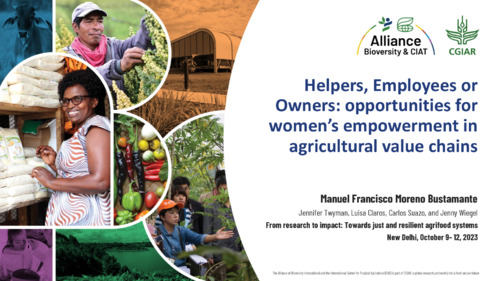Helpers, employees or owners: Opportunities for women’s empowerment in agricultural value chains
Currently there is little evidence on differentiated gender roles and empowerment in value chains in the Latin America region and few comparative analyses on value chains and between value chain nodes. In this study, we examine different indicators of women’s empowerment among the production and processing nodes of two agricultural value chains—cashew and dairy—in Honduras to understand whether and how women’s roles in the value chains are related to their empowerment. We used qualitative data collected in interviews, participatory workshops and focus groups, and quantitative data from intrahousehold surveys. Qualitative data assessed and compared men’s and women’s participation in productive tasks, decisionmaking, asset ownership, and gender norms and beliefs about appropriate activities within value chains. Quantitatively, we analyzed data on households, agricultural production, processing activities and women’s empowerment indicators (using the A-WEAI). The results suggest that levels of empowerment differ (as measured by the A-WEAI) between value chains and at different levels of value chain nodes. Women in processing nodes have lower levels of empowerment than those in production nodes, which contrasts with literature results. Indeed, in other regions such as Africa or Asia, women’s empowerment has been found higher in the processing node because of greater employment opportunities. In our case, the various indicators of empowerment show that women in processing nodes in Honduras face greater time burdens associated with employment and care, which contributes to lower empowerment. The relevance of the study lies in addressing methodological and knowledge gaps in the region.

